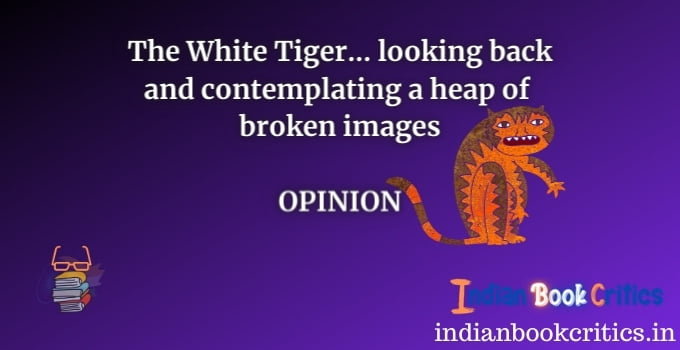Though the book brought fame and wealth, feet in the elite clubs where ‘liberals’ engage and discuss poverty having thousand-dollar wine, Man Booker Award and what not, have you read the novel The White Tiger by Aravind Adiga? The White Tiger, declared a masterpiece by critics and the jury that decided the award, lacks not only in content but also in terms of style, the arc of fiction and the circle that looks stunning only when it’s complete and otherwise ugly-looking literary circumference that brings no wonders for the readers. Why am I saying so? How can I speak such things about The White Tiger? How can I criticise a novel that has claimed the Man Booker Award? There must be many questions in your mind right now. Let me share my opinions below.
“Neither you nor I speak English, but there are some things that can be said only in English.”
It begins with a soliloquy and goes on with the self-satisfying and self-directed narrative in the first-person with jibes on India that the author has been continuously taking in his novel, throughout. Though the novel is about a poor person, Balram Halwai, who murdered his masters and ‘put his family in danger’ as a sacrifice, a person who does not know English and brags about it on several occasions in the novel, it has many political, cultural and national conclusions about India that should never have been made or should have met with equal opposites that do exist in India whether Adiga, an Indian who seldom lived in India in his ripening years, knows or not.
The whole novel or the entire novel you may say it if you still consider it that way is a piece of punctured narrative that seldom settles down as a novel of repute. I will, any day, believe and tell others to believe that Jhumpa Lahiri is a far better novelist than Aravind Adiga is… her novels are complete in whatever form she writes or whatever aspect of diasporic emotions she wants her readers to take a dip in.
Discount the political, cultural and a few religious references in the novel and you should see it in the trash for many readers who want to read substance. I still confuse myself when I try to understand how and why this novel could win the ‘prestigious’ Man Booker Award… it’s like seeing Luca Modric winning the Ballon d’Or or worst, Andre Gomes claiming the same with only 7 games to start and 9 from the bench…
“One fact about India is that you can take almost anything you hear about the country from the prime minister and turn it upside down and then you will have the truth about that thing.”
This is what the jury loves to read. This is what makes such mediocre fiction writing with dissatisfaction, guilt, attempt to escalate one’s fate and bam win big prizes and you have an overnight sensation ready to preach India on politics, culture, development and so on. However, there are critics who could see what other mortals like us could not and find supreme quality irony, satire, realism and many more. Well, that’s the work a critic does. However, when you give work by a nine-year-old to a critic without telling about the author and labelling the work with something like the winner of the prestigious commonwealth literature award and Man Booker award for 2021… see the magic! Everything will be red at the same hour!
Aravind Adiga’s success lies in bringing a hero who is rather a villain and who represents the frustrated people with ambition (and no education because of many active and passive reasons). However, the narrative and poor style of writing, I should say, spoils the game and if we remove that honourary badge of Booker award from the book, the novel could never sell more than a hundred copy in India – prove me wrong!
BY Balram Halwai
(Ashish for Indian Book Critics)
